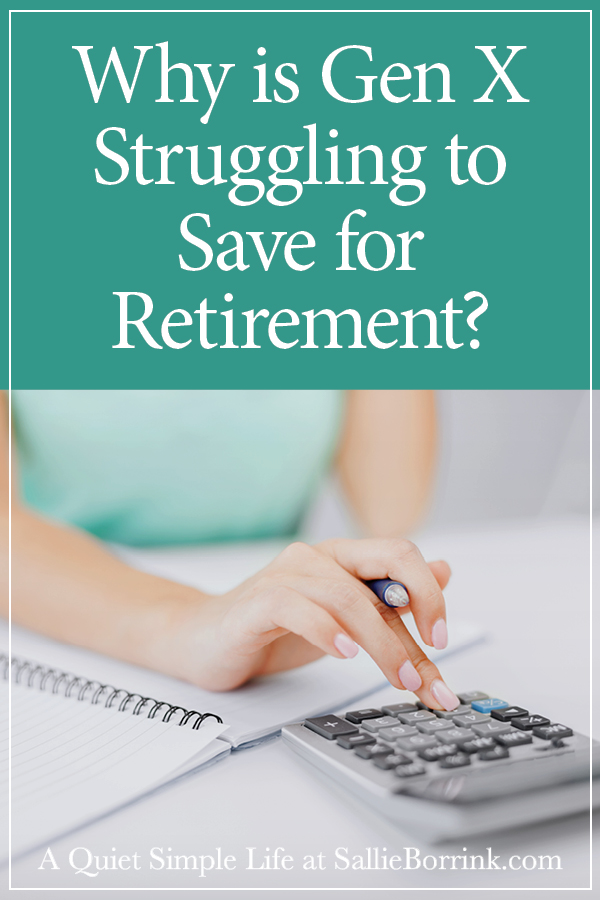Almost daily there are new articles explaining that Gen X isn’t saving enough for retirement. The financial elites and professionals lament how terrible this is and remind Gen Xers that they need to try harder because every year that passes things get more dire.
Do they really think Gen Xers aren’t keenly aware that they are in trouble regarding their retirement?
There is a reason why Gen X is in trouble and it isn’t because they buy a coffee at Starbucks every so often or take their kids on a cheap family vacation once every few years.
A significant portion of Gen X can’t save because they have nothing to save.
Generation X Struggling to Achieve Middle Class
The average middle class life was generally defined as saving for a rainy day, paying your bills, sending your kids to college, saving for retirement, taking a family vacation once a year, owning a home, etc. That middle class life in America today (adjusted for location) now costs $130,000. How many Gen Xers are bringing in $130,000 a year? How many Gen Xers are making even $100,000 a year?
Neal Gabler lifted the curtain on his own financial struggles in The Secret Shame of Middle-Class Americans in The Atlantic. In this eye-opening piece and the video below, he chronicles his own financial difficulties. If you are struggling to get by and are finding saving for retirement to be almost impossible, you must read this article and watch this video.
Gabler said in the video that one email he received from a reader said, “Thank you. Thank you. Thank you. Now I know I am not alone.”
No, that reader is not alone. And neither are you if you are reading this and struggling to make ends meet, let alone save for retirement.
Gen Xers Fighting Through Financial Storms
There are two key statements in the video that apply to Gen Xers saving for retirement. Everyone has a story about what has happened that has derailed their financial life, but most of the stories boil down to one of these two sentiments.
“We live within a storm” (8:15)
“We thought it was just a rough patch. It turned out to be our life.” (14:00)
Most Gen Xers who are struggling are not struggling due to a series of poor or extravagant choices. They are struggling because you can only weather so many financial storms before the water starts getting in the boat faster than you can get it out. They are also struggling against a system that is horrifically ruined in so many ways (as is evidenced by the information in the links below).
Generation X is Struggling to Save for Retirement
The “middle class” members of Gen X are going to have to be extraordinarily creative when it comes to retirement. I put “middle class” in quotes because many Gen Xers have the education and drive to achieve a middle class life, but the financial situations in this country work against them in almost every possible way.
Charles Hugh Smith from Of Two Minds has done an excellent job in outlining the difficulties over the years. I started reading his blog many years ago – before the housing bubble. Here is a sampling of the posts he has written regarding why the middle class is ruined and is struggling to basically maintain a working class life, even with a college education.
- America’s Concealed Crisis: Fifty Years of Economic Decline, 1969 to 2019
- How Many Households Qualify as Middle Class?
- What Does It Take to Be Middle Class?
- Misplaced Pride: Most of the “Middle Class” Is Actually Working Class
- Financial Storm Clouds Gather
Some people might find this reading depressing. In a way, it is. But I also find it helpful because I realize that our struggles are not unique. Yes, there are people who waste money. But there is a systematic failure on many levels that is making it terribly difficult for the average Gen X family to get by, let alone save for retirement.
Here is Gabler discussing his article with The Atlantic.










 How Many Gen Xers Are Making $100,000 a Year?
How Many Gen Xers Are Making $100,000 a Year?
On the one hand, I think he makes some valid points. Monetary policy has rendered the dollar less and less valuable. On the other hand the average square footage of an American home has more than doubled while family sizes have dropped. We also have technology available to us that previous generations never imagined and that technology is ever more affordable. Food and gasoline are also cheaper in constant dollars than they were in the 50’s. Government is the problem. It costs a median income family more money to pay their taxes (all taxes combined, based on average rates) than it does housing, food, and health care combined. In addition, government meddling has made college education, housing, and health care ever more costly while other products that government is less involved in have dropped in price. If members of my generation want to retire we’re going to have to aggressively fight the growth of government and start pushing for it to start shrinking.
I agree that government is a huge part of the problem, especially as it relates to college costs and health care.
Housing is a problem for many reasons, but I don’t think the larger average size is necessarily the biggest reason. For example, many people are being priced out of the area where they have always lived due to an influx of foreign investors and/or people moving from expensive states who have extra money due to selling their house at inflated prices and being able to “overpay” for a house in the less expensive area they have moved to. I repeatedly see this come up in discussions re: destination states where the cost of living is lower.
The disposable culture is a huge problem. In the past, you could purchase appliances and expect them to last a long time – decades, even. Now they break down and we have to replace them within 5-8 years.
The two income trap we now find ourselves in as a nation is also a significant part of the problem. That’s another post for another day.
It is complex, but I am always cautious when blaming people for things like eating out and buying a big house. Yes, that certainly is a factor for some families. But the problems are much more complex than people just needing to try harder which is usually the advice given to Gen Xers who are behind on retirement.
Many people have never recovered from the Great Recession. And even people who have recovered on paper haven’t really recovered because their “recovery” is in their housing equity and 401k gains – both of which are not liquid and will eventually drop off again. Housing has already peaked nationally and is starting to drop off.
It’s a complex problem, but we still have to find a way to overcome it individually and as couples/families.
I agree Judith!
Sally, thank you for taking the time and effort to put out such wise, practical and helpful posts. I pop over to read quite often and enjoy all the great food for thought but haven’t gotten my thoughts together to comment. Tonight, though, I want to thank you for the Neil Gabler article. It is really eye-opening, as are your related Gen X posts in the past couple of weeks. There is such a push to be “middle class” that we never really know the hoops many of us Generation Xers are jumping through to keep it up.
Hi Erin,
You’re welcome. Thank you for the encouraging comment. I am really interested in looking at the plight of Gen Xers who are in the deadly middle. They make too much money to receive any kind of assistance but don’t make nearly enough to achieve what most would have considered a middle class life 20-40 years ago.
People can only prop things up for so long with credit. The next recession is going to wipe a lot of people out. There are too many families hanging on by a thread. And I don’t mean propping up with credit in terms of vacations and such. I’m talking about medical bills, prescriptions, groceries, gas, utility bills, etc.
Sallie, we are now at the “next recession” that you referred to 3 1/2 years ago in this comment.
And I do believe you are correct in your prediction.
I just told my husband this week that I never expect either one of us to retire, as we can see the writing on the wall. We were both born in the mid to late-1970s.
My father, a Boomer, retired at age 55.
What a difference a generation makes.
-Lauren